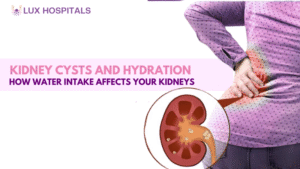10 Early Signs of Cushing’s Syndrome You Shouldn’t Ignore
Cushing’s Syndrome is a serious health condition that stems from prolonged exposure to high levels of cortisol. Cortisol, often referred to as the “stress hormone,” plays many vital roles in the body, such as regulating metabolism, reducing inflammation, and controlling the body’s stress response. However, when cortisol levels are elevated for an extended period, it can lead to various complications, which is the basis of this condition.
Cushing’s Syndrome is relatively rare, but early detection is crucial for effective treatment and preventing long-term health issues. The syndrome often progresses slowly, and its early signs can be mistaken for other common conditions or even the natural process of aging. In this blog, we’ll explore the early symptoms you should be aware of if you or someone you know may be at risk.
What is Cushing’s Syndrome?
Cushing’s Syndrome occurs when the body is exposed to excessive amounts of cortisol over time. This can be due to internal factors, like the body producing too much cortisol, or external factors, such as long-term use of corticosteroid medications (often prescribed for inflammatory conditions or immune disorders). In some cases, the excess cortisol is the result of a benign tumor on the pituitary gland, which stimulates the adrenal glands to produce more cortisol than needed.
While anyone can develop this condition, it tends to occur more frequently in women than men, and typically affects individuals between the ages of 20 and 50. The condition can lead to a wide variety of symptoms, as cortisol influences several different body systems. Because of this, diagnosing Cushing’s Syndrome in its early stages can be a challenge. However, recognizing these early signs is critical to managing the syndrome and preventing more severe complications down the road.

10 Early Signs You Shouldn’t Ignore
Identifying early symptoms is essential to catching this condition before it causes significant harm. The following signs are among the most common early indicators of excess cortisol production.
1. Unexplained Weight Gain
One of the most prominent early signs of Cushing’s Syndrome is sudden, unexplained weight gain, particularly around the abdomen, upper back, and face. People with Cushing’s Syndrome often notice that while they are gaining weight in these areas, their arms and legs remain relatively thin. This type of fat redistribution is a hallmark feature of Cushing’s Syndrome, making it different from typical weight gain caused by diet or inactivity.
If you’ve been gaining weight, especially around your midsection and face, without any changes to your diet or lifestyle, it could be an early sign of Cushing’s Syndrome.
2. Facial Changes (Moon Face)
Another common symptom associated with this condition is a change in the appearance of the face, often described as “moon face.” This term refers to the characteristic round, puffy look that develops due to fat deposits forming around the face. For many, this is one of the first visible indicators that something is wrong.
Moon face doesn’t happen overnight—it develops gradually. People may not immediately notice the change, but over time, the difference becomes striking. This facial swelling is not only cosmetic but also a reflection of underlying issues that need to be addressed.
3. Skin Problems: Acne, Thinning, and Easy Bruising
Changes in the skin are another early indicator of elevated cortisol levels. Individuals with this condition often notice that their skin becomes thinner and more fragile. As a result, they bruise more easily, even from minor bumps. Additionally, they may experience slow healing of cuts, along with an increase in acne or other skin issues.
One specific sign is the appearance of purple or red stretch marks on the abdomen, thighs, breasts, or arms. These stretch marks are larger and more noticeable than those caused by weight gain or pregnancy, and they occur because cortisol weakens the skin’s structure. If you’ve been noticing persistent skin changes, especially stretch marks in unexpected places, it may warrant further investigation.
4. Persistent Fatigue and Muscle Weakness
Fatigue is a common symptom of many conditions, but in people with Cushing’s Syndrome, it is often paired with significant muscle weakness. This weakness tends to affect the muscles of the upper arms and legs, making daily activities—like climbing stairs, lifting objects, or exercising—more difficult than usual.
The muscle weakness in Cushing’s Syndrome is caused by the breakdown of muscle tissue due to prolonged high cortisol levels. If you are experiencing persistent fatigue or muscle weakness that doesn’t improve with rest, it could be an early warning sign of Cushing’s Syndrome.
5. Elevated Blood Pressure
Hypertension, or high blood pressure, is another early symptom. Cortisol plays a crucial role in regulating blood pressure, and when levels are too high for too long, it can lead to persistent hypertension. Even if you don’t have a history of high blood pressure, this condition can cause it to develop or worsen.
If you have been diagnosed with high blood pressure, particularly if it’s resistant to treatment, and are experiencing other symptoms like weight gain or fatigue, it’s important to mention these concerns to your doctor. High blood pressure in combination with other symptoms could point to this syndrome.
6. Mood Swings, Anxiety, and Depression
Cortisol doesn’t just affect the body; it also has a significant impact on the brain. People with this condition often experience mood swings, increased anxiety, depression, or irritability. While mental health changes are common for many reasons, they can be an important indicator of an underlying hormonal issue when combined with physical symptoms.
These emotional changes might be subtle at first, and many people chalk them up to stress or life circumstances. However, in the context of other symptoms, these mood disturbances may be a sign that your cortisol levels are too high and need to be addressed.
7. Irregular Menstrual Cycles in Women
For women, Cushing’s Syndrome can cause disruptions in the menstrual cycle. Hormonal imbalances related to elevated cortisol levels can lead to irregular periods or, in some cases, the complete absence of periods. Some women with Cushing’s Syndrome may also experience difficulty with fertility due to these hormonal changes.
If you’ve noticed changes in your menstrual cycle and are experiencing other symptoms such as weight gain or fatigue, it’s important to talk to your doctor about whether Cushing’s Syndrome could be the underlying cause.
8. Bone Weakness and Osteoporosis
High levels of cortisol can interfere with the body’s ability to absorb calcium, leading to weakened bones and an increased risk of osteoporosis. Individuals with Cushing’s Syndrome are more prone to fractures, even from minor falls or injuries. If you’ve experienced unexplained bone pain, particularly in your hips or back, or have suffered fractures with little to no trauma, it could be an early sign of Cushing’s Syndrome.
Bone loss is a serious complication of Cushing’s Syndrome, and early detection is essential to preventing long-term damage.
9. Cognitive Difficulties: Memory and Concentration Problems
Another potential early sign of Cushing’s Syndrome is difficulty with cognitive functions, such as memory and concentration. High cortisol levels can interfere with brain function, leading to what is commonly described as “brain fog.” Individuals with Cushing’s Syndrome may find it harder to focus on tasks or may struggle with short-term memory.
If you’ve noticed that your ability to concentrate has declined or that you’re having trouble remembering things, and these issues are occurring alongside other symptoms, it could be linked to Cushing’s Syndrome.
10. Increased Susceptibility to Infections
Cortisol suppresses the immune system, making it harder for the body to fight off infections. People with this condition often find that they get sick more frequently or that they take longer to recover from common illnesses like colds or respiratory infections.
If you’ve been experiencing a pattern of frequent illnesses or slow recovery times, this could be an early indication that your immune system isn’t functioning properly due to excessive cortisol production. This is particularly concerning for those who notice a combination of physical and immune-related symptoms.
The Importance of Early Detection
Recognizing these early signs can make a significant difference in managing and treating the condition. If left untreated, this condition can lead to more severe complications such as cardiovascular disease, diabetes, and osteoporosis. The earlier the condition is diagnosed, the better the chances are for effective treatment and minimizing long-term health risks.
Treatment usually focuses on reducing cortisol levels, either through medication or surgery, depending on the underlying cause. Lifestyle changes, such as stress management techniques and a healthy diet, can also play a critical role in managing the condition. However, the first step toward recovery is identifying the symptoms and seeking medical advice.
What to Do If You Notice These Symptoms
If you’ve noticed any of the signs discussed in this blog, it’s essential to speak with a healthcare professional. Diagnosing Cushing’s Syndrome involves a combination of physical exams, blood tests, urine tests to measure cortisol levels, and imaging studies to determine whether a tumor is present on the adrenal or pituitary glands.
Once Cushing’s Syndrome is diagnosed, your doctor will work with you to determine the best treatment plan based on the underlying cause of the condition. Early treatment can help manage symptoms and prevent long-term complications, making it important to act quickly if you suspect you have Cushing’s Syndrome.
Conclusion
Cushing’s Syndrome can be a challenging condition to diagnose because many of its early signs are subtle and develop gradually. However, by being aware of symptoms like unexplained weight gain, fatigue, skin changes, and mood swings, you can take the first step toward identifying the condition and seeking treatment.
If you or a loved one is experiencing symptoms of Cushing’s Syndrome, early diagnosis is crucial for effective treatment. At Lux Hospitals, our expert endocrinologists and healthcare team specialize in diagnosing and managing complex hormonal conditions like Cushing’s Syndrome. Don’t ignore the signs—schedule a consultation today to receive personalized care and the most advanced treatment options available.
Frequently Asked Questions
Early signs include unexplained weight gain around the abdomen, face, and upper back, “moon face,” purple stretch marks, fatigue, muscle weakness, high blood pressure, mood swings, and skin changes like thinning or easy bruising. Recognizing these early helps in timely diagnosis and treatment.
Diagnosis involves a combination of blood and urine tests to measure cortisol levels, along with imaging studies such as CT or MRI scans to detect tumors on the pituitary or adrenal glands. Early diagnosis is crucial for effective treatment.
Yes. Treatment depends on the underlying cause. Surgery to remove tumors, medications to control cortisol levels, or adjusting long-term steroid use can effectively manage the condition. Early intervention improves the chances of complete recovery.
Cushing’s Syndrome in adults can be caused by overproduction of cortisol due to pituitary or adrenal tumors, prolonged use of corticosteroid medications, or, rarely, tumors elsewhere in the body that increase cortisol production.
While medical treatment is essential, lifestyle measures—like eating a balanced diet, exercising regularly, managing stress, and following medical advice—can help manage symptoms, support recovery, and reduce complications associated with high cortisol levels.





















